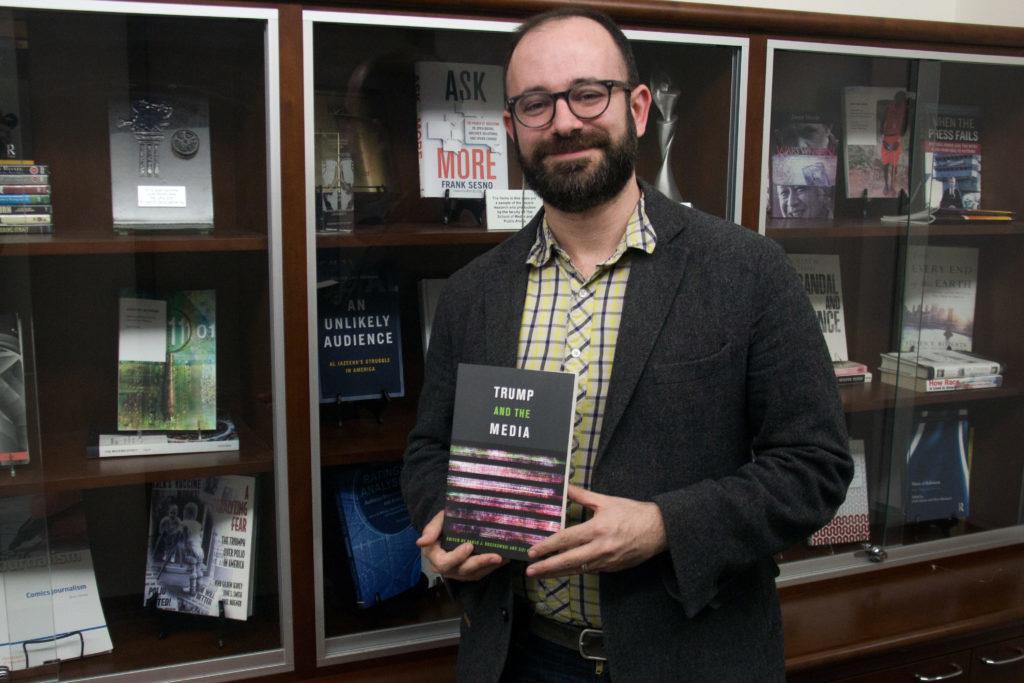Updated: April 2, 2018 at 1:00 p.m.
Three professors in the School of Media and Public Affairs contributed to the first academic book on President Donald Trump and the media.
The book, “Trump and the Media,” which chronicles everything from the mainstream media’s coverage of the 2016 presidential campaign to Trump’s use of Twitter to drive the news cycle, was published last month with insight from 31 contributors. SMPA professors said the textbook will give journalism students a deeper understanding of the frenzied media climate in the Trump administration.
The book is a collection of essays that touch on the Trump-era transformation of the relationship between media and politics.
SMPA faculty were contacted to lend their expertise to the book after the project’s editors – Zizi Papacharissi, the head of the communication department and a professor of political science at the University of Illinois-Chicago, and Pablo Boczkowski, a communication studies professor at Northwestern University – started compiling it in the fall of 2016.
David Karpf, an associate professor of media and public affairs and the director of the media and strategic communication master’s program, wrote a chapter for the book last spring focused on the antagonistic relationship between Trump and the media.
He said the book will be a resource for journalism scholars to understand Trump’s impact on the field. He said parts of the book also compare Trump to past presidents and their relationship to the media.
“It was a campaign that featured a lot of behavior that breaks established norms and precedents that we’re used to studying,” he said. “So I think there was broadly among the academic community a sense that we needed to grapple with this, as a practical matter.”
SMPA faculty scrambled to adapt their classes to prepare students to handle Trump’s media attacks shortly after he was inaugurated in January 2017. Since the election, faculty said Trump has become a constant topic in the classroom.
Karpf saw the need to contribute to the book after witnessing journalists refusing to acknowledge that they were being mistreated by the current administration, he said.
“I’ve read a bunch of journalists saying that we’re not the government’s enemy and we shouldn’t accept being treated as the enemy or treated as the villain,” he said. “If somebody declares war on you, you need to react as though someone has declared war on you.”
Silvio Waisbord, SMPA’s associate director and a professor of media and public affairs, said his chapter looks at how Trump and ideologically extreme groups have used social media and sensationalist outlets to push radical opinions in the mainstream.
He said that mainstream media outlets have done a poor job of curating what is and isn’t real news, meaning fake news – often a tool used to boost fringe groups and their ideologies – has proliferated, particularly on social media.
“He’s not the disruptor, but he’s the symptom of the disruptions,” Waisbord said, referring to Trump.
The book – a series of “snapshots” on changes in journalism over the past two years – will be a resource to students studying rapid changes in political communication and journalism, he said.
“What’s happening now is so dramatically different, it’s so unique,” Waisbord said. “This book will help students to get a sense of what is really changing, why it’s such a unique moment that is sort of captured by Trump, media, politics.”
He added that he worked on the book with the help of two graduate students, Zoey Lichtenheld and Tina Tucker, with whom he discussed ideas and who found some specific examples of conspiracy theories spreading online.
Nikki Usher, an associate professor of media and public affairs, also contributed to the book but did not return a request for comment.
Lichtenheld said that although the book is accessible to the general public, its intended audience is the research community because it’s comprised of scholarly essays.
Faculty said the number of professors and students who contributed to the book reflected well on SMPA and its role in teaching the ever-changing field of journalism.
The ability to contribute to the first academic work examining the relationship between Trump and the media “really spoke to the unique opportunities” to do analysis of real-world journalism in SMPA, Lichtenheld said.
“I don’t think that’s something I would’ve gotten elsewhere,” she said.
This post was updated to reflect the following correction:
The Hatchet incorrectly used Nikki Usher’s hyphenated name. It is correct now. We regret this error.





